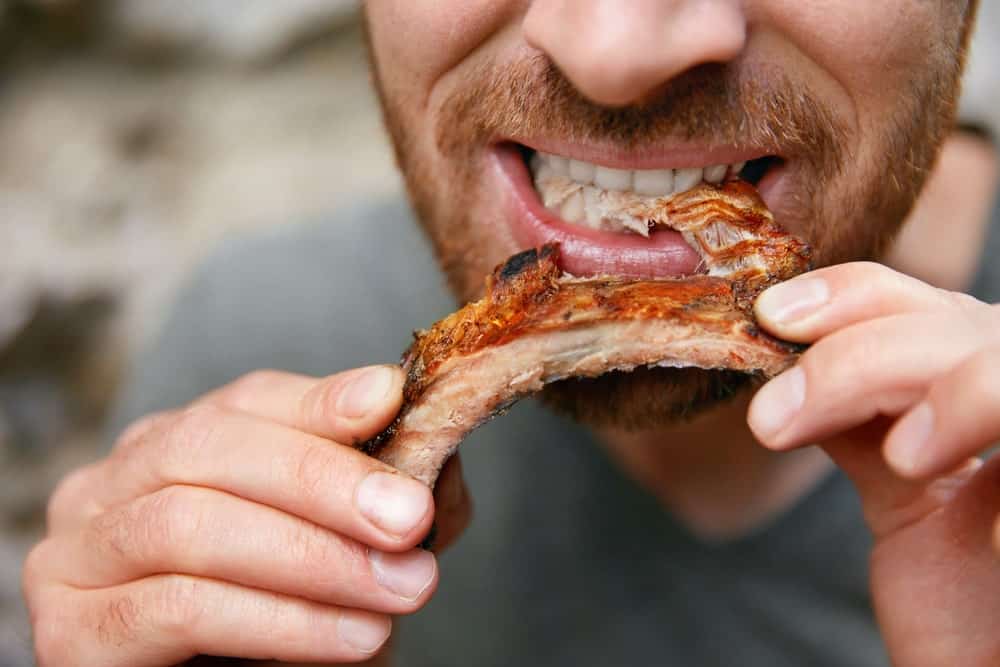Is Eating Pork a Sin in Christianity? Unveiling Biblical Perspectives
In Christianity, the question of whether eating pork is considered a sin has been debated for centuries. The Bible presents varying viewpoints on this topic, leading to different interpretations by Christians worldwide.
This article will explore what the Bible says about consuming pork and discuss its implications for Christian beliefs and practices.
Historical Context of Pork Prohibition
Jewish Kosher Laws
The prohibition of consuming pork has its roots in the Jewish Kosher Laws, which are detailed in the Hebrew Bible, particularly in Leviticus 11:3 and Deuteronomy 14:8.
“Whatsoever parteth the hoof, and is clovenfooted, and cheweth the cud, among the beasts, that shall ye eat.”
“And the swine, because it divideth the hoof, yet cheweth not the cud, it is unclean unto you: ye shall not eat of their flesh, nor touch their dead carcase.“
These laws outline the division of animals into clean and unclean, with pigs being classified as unclean due to their lack of cud-chewing, despite their divided hooves.
The consumption of pork was not only prohibited but even touching the meat of swine made an individual ritually unclean.
Early Christianity and Dietary Rules
Early Christians, who emerged from Jewish communities, initially adopted the dietary restrictions found in the Old Testament. However, with the spreading of Christianity to Gentile populations, the adherence to these laws began to change.
The Apostle Peter experienced a vision (Acts 10:9-16) in which God declared that all animals were clean, leading to the belief that the dietary restrictions no longer applied to Christians
Furthermore, the Apostle Paul argued that the Kingdom of God is not about observing dietary laws, but about righteousness, peace, and joy in the Holy Spirit.
“For the kingdom of God is not meat and drink; but righteousness, and peace, and joy in the Holy Ghost.”
This emphasis on faith rather than specific dietary restrictions contributed to the evolving views on pork consumption in Christianity.
Is Eating Pork a Sin?
In Christianity, the question of whether eating pork is a sin has been debated for centuries. According to the Old Testament, certain foods, including pork, were considered unclean and should not be consumed.
“And the swine, though he divide the hoof, and be clovenfooted, yet he cheweth not the cud; he is unclean to you.“
However, Jesus altered these dietary restrictions in the New Testament.
“Because it entereth not into his heart, but into the belly, and goeth out into the draught, purging all meats?”
Furthermore, the Apostle Peter received a message from God in a dream, indicating that the dietary laws had changed (Acts 10:9-16). This shift in the rules signifies that Christians are no longer bound by the restrictions regarding the consumption of pork.
The apostle Paul addresses the issue of eating pork in the context of the broader concept of food consumption, stating “the kingdom of God is not a matter of eating and drinking, but of righteousness, peace, and joy in the Holy Spirit” (Romans 14:17).
This reaffirms that the focus of Christianity should be spiritual rather than on specific food constraints.
From these passages, it can be inferred that eating pork is not considered a sin in Christianity. Christians are allowed to consume various types of food, including pork, shrimp, seafood, meat, and vegetables.
The main emphasis in Christianity lies in spiritual growth, faith, and the pursuit of righteousness, rather than adhering to strict dietary rules.
What Does The Bible Say About Christians Eating Pork? (References)
Old Testament Views on Pork
In the Old Testament, there are specific laws regarding the consumption of pork.
“And the pig, though it has a divided hoof, does not chew the cud; it is unclean for you. You must not eat their meat or touch their carcasses; they are unclean for you.”
Further, Deuteronomy 14:1-8 also mentions the prohibition of pork consumption for the Israelites.
These dietary laws, which include the prohibition against eating pork, were given to the Israelites for religious and, perhaps, health reasons.
Isaiah 66:17 emphasizes that eating “unclean things” such as pork would have consequences.
“They that sanctify themselves, and purify themselves in the gardens behind one tree in the midst, eating swine’s flesh, and the abomination, and the mouse, shall be consumed together, saith the Lord.“
New Testament Perspectives
However, the New Testament offers a different perspective on pork consumption for Christians. In the book of Acts 10:9-16, Peter has a vision where he is shown various unclean animals and is told to eat them.
Peter initially refuses, referring to the dietary laws in the Old Testament. However, he is later instructed by God to not consider anything impure that He has made clean.
This passage in Acts can be interpreted to suggest that dietary laws from the Old Testament are no longer applicable to the followers of Christ.
With the arrival of Jesus, the covenant between God and His people has changed, and the laws regarding the consumption of unclean animals like pork can be viewed as no longer binding for Christians.
Modern Christian Views on Pork
Catholicism
In Catholicism, eating pork is not considered a sin. The dietary restrictions of the Old Testament were lifted in the New Testament. This change can be attributed to the teachings of Jesus and Saint Peter, who declared all foods clean. (Mark 7:19, Acts 10:9-16).
As a result, Catholics are free to consume pork without facing any spiritual consequences.
Protestantism
Protestant denominations also do not view eating pork as a sin. Like Catholics, they rely on the New Testament teachings that lifted the Old Testament dietary restrictions.
“It is not what goes into the mouth that defiles a person, but what comes out.”
Matthew 15:11 supports the idea that pork consumption is not a sin for believers.
Eastern Orthodox Church
The Eastern Orthodox Church, similar to Catholicism and Protestantism, does not consider eating pork a sin. They believe that adherence to the Old Testament dietary laws is not necessary, as the New Testament teachings prevail.
Followers of the Eastern Orthodox Church are therefore allowed to eat pork without it being a sin.
Is Eating Pork a Sin in Hinduism? (Any Punishments)
In Hinduism, eating pork is not explicitly considered a sin. However, the consumption of meat, especially cow meat, is generally discouraged in Hinduism.
Many Hindus choose to follow a vegetarian diet due to the belief in ahimsa (nonviolence) towards all living beings. There are no specific punishments mentioned for those who consume pork in Hinduism.
Is Eating Pork a Sin in Adventist? (Any Punishments)
Seventh-day Adventists, a Protestant Christian denomination, do not strictly forbid eating pork, but they strongly encourage a vegetarian or plant-based diet.
Some Adventists may choose to abstain from pork consumption, but there are no specific punishments for those who do eat it. The focus is on promoting a healthy lifestyle and adhering to biblical principles.
Is Eating Pork a Sin in Judaism? (Any Punishments)
In Judaism, eating pork is considered a sin as it goes against the dietary restrictions outlined in the Torah. According to the Torah, pigs are considered unclean animals, and their meat is forbidden for consumption (Leviticus 11:7-8, Deuteronomy 14:8).
Observant Jews who eat pork may face social consequences, but specific punishments are not mentioned in religious texts.
Will I Be Forgiven for Eating Pork or Go to Hell?
In Christianity, the consumption of pork is not considered a sin. The dietary restrictions found in the Old Testament, specifically in Leviticus 11:7-8, were meant for the Israelites and not for Christians.
Jesus later declared all foods clean, as stated in the New Testament, Matthew 15:17-20.
“Do not ye yet understand, that whatsoever entereth in at the mouth goeth into the belly, and is cast out into the draught? But those things which proceed out of the mouth come forth from the heart; and they defile the man. For out of the heart proceed evil thoughts, murders, adulteries, fornications, thefts, false witness, blasphemies: These are the things which defile a man: but to eat with unwashen hands defileth not a man.”
It is important to note that the early Christian church comprised of Jews and Gentiles. The apostle Peter had a vision in which God showed him a variety of animals considered unclean according to Jewish law.
God then directed Peter to eat these animals, emphasizing that all creatures could be consumed (Acts 10:9-16). This event helps signify the removal of any restrictions on the consumption of certain foods, including pork, for Christians.
The focus in Christianity is not on which foods to eat or avoid but on one’s faith and relationship with God.
The Apostle Paul addressed this issue in his letters to the Romans (Romans 14) and the Corinthians (1 Corinthians 10). He advised Christians to respect each other’s convictions regarding the consumption of certain food items.
Meats to Avoid as a Christian & Why?
In Christianity, the dietary laws have evolved throughout time. Initially, many Christians abided by Old Testament regulations which included certain restrictions on meat consumption.
Specifically, Leviticus 11:7-8 and Deuteronomy 14:8, it states that pigs are unclean animals, prohibiting their meat consumption or even touching their carcasses.
Here are some key points regarding dietary regulations from the Old Testament:
- Clean Animals: Leviticus 11:3-8 lists the animals that were considered clean and could be eaten. It includes animals that have cloven hooves and chew the cud, such as cattle, sheep, goats, and deer.
- Unclean Animals: Leviticus 11:4-7 and Leviticus 11:9-12 list the animals that were considered unclean and were not to be eaten. This includes animals like pigs, camels, rabbits, and certain types of seafood without fins and scales.
- Birds: Leviticus 11:13-19 specifies which birds were considered unclean and not to be eaten. Examples include eagles, vultures, and owls, while birds like doves and chickens were considered clean.
- Seafood: Leviticus 11:9-12 mentions that seafood without fins and scales, such as shellfish (shrimp, crab, lobster) and certain types of fish, were considered unclean and not to be consumed.
However, these dietary restrictions primarily applied to the Israelites and later became less emphasized as Christianity expanded.
In the New Testament, it is clear that these dietary restrictions have been loosened for Christians. In Acts 10:9-15, Peter receives a vision from God, telling him that all animals have been made clean to eat, signifying that the old dietary laws no longer apply.
Moreover, the apostle Paul, in 1 Timothy 4:1-5, warns Christians that some may teach them to follow the Mosaic dietary laws, but this is considered a “doctrine of demons.” Thus, Christians are no longer bound by the restrictions placed on the Israelites.
“Now the Spirit speaketh expressly, that in the latter times some shall depart from the faith, giving heed to seducing spirits, and doctrines of devils; Speaking lies in hypocrisy; having their conscience seared with a hot iron; Forbidding to marry, and commanding to abstain from meats, which God hath created to be received with thanksgiving of them which believe and know the truth. For every creature of God is good, and nothing to be refused, if it be received with thanksgiving: For it is sanctified by the word of God and prayer.”
However, it is essential for Christians to maintain a focus on their spiritual health and follow dietary practices that align with their beliefs.
In cases where a Christian has a strong personal conviction against eating certain meats, it should be respected. This choice should be based on their relationship with God, not an obligation to follow Old Testament laws.
Frequently Asked Questions
Is eating pork a sin in the Old Testament before Jesus was born?
In the Old Testament, eating pork was considered a sin for the Israelites. Leviticus 11:7-8 specifically prohibits the consumption of pork, stating that pigs are unclean animals, and their meat should not be eaten.
Is it a Sin to Kill a Pig for Food?
Killing a pig for food is not considered a sin in Christianity as the dietary restrictions for Christians were amended after the arrival of Jesus Christ. However, it is important to note that these restrictions still apply to people of the Jewish and Islamic faiths.
Sin to eat pork/bacon as Christian?
For Christians, eating pork is not considered a sin. The New Testament, specifically in Acts 10 and Romans 14, highlights the shifting perspective on dietary restrictions after Jesus Christ, allowing Christians greater freedom in their food choices, including the consumption of pork.
Why is pork considered unclean?
Pork was considered unclean in the Old Testament due to the specific religious beliefs and health reasons at the time. Pigs were viewed as unhygienic animals, and their behavior and diet were also considered impure. However, with modern food safety practices and better understanding of animal behavior, these concerns are less relevant today.
Pork sin Bible verse KJV
In the King James Version (KJV) of the Bible, Leviticus 11:7-8 specifically addresses the consumption of pork.
“And the pig, though it has a divided hoof, does not chew the cud; it is unclean for you. You must not eat their meat or touch their carcasses; they are unclean for you.”
This verse reflects the dietary restrictions imposed on the Israelites in the Old Testament but does not dictate the same restrictions for Christians in the New Testament.







